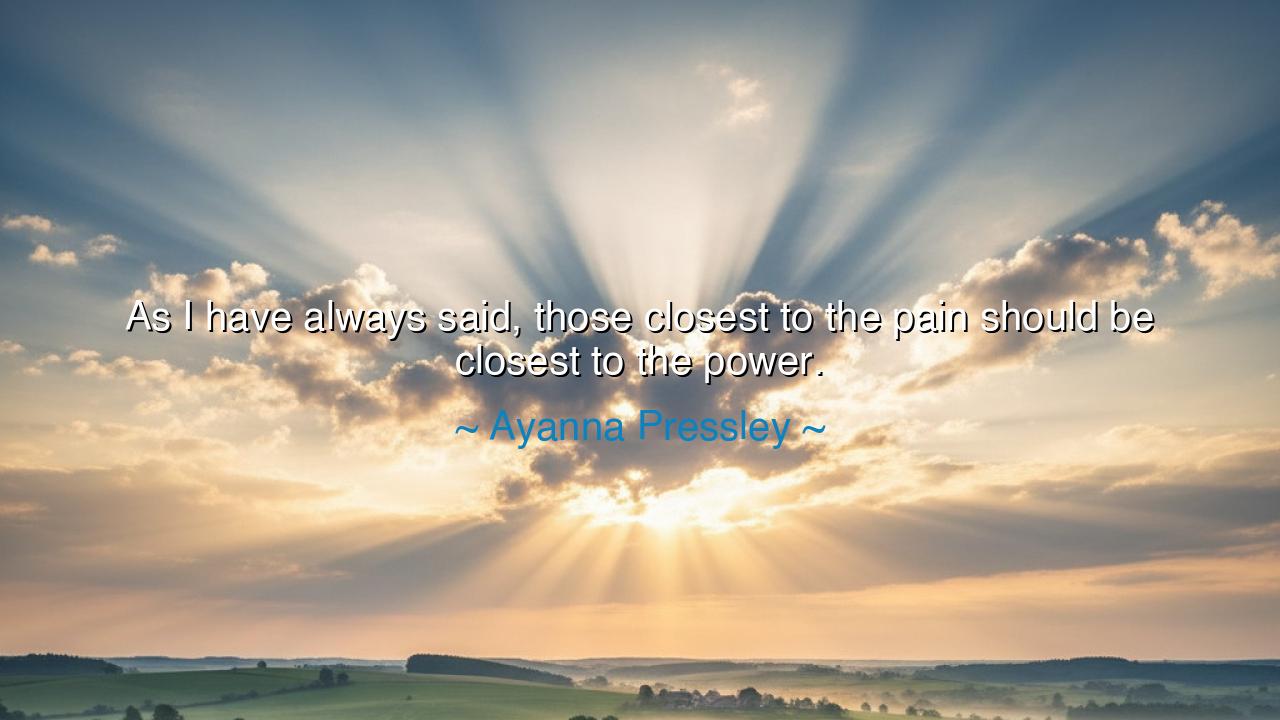
As I have always said, those closest to the pain should be






Hear me, O children of the future, for I bring you the wisdom of Ayanna Pressley, who declared: "As I have always said, those closest to the pain should be closest to the power." These words resonate with the deepest truth: that those who bear the heaviest burdens should be at the heart of decision-making. When those who experience suffering, injustice, and inequality are given the authority to shape the future, they carry with them the profound understanding needed to bring about true change. It is through their lived experiences, their trials, and their perseverance that they possess the strength and wisdom to lead.
Consider the great ancient leaders who understood the importance of leadership grounded in the pain of the people. Moses, called upon to lead the Israelites out of slavery, was no stranger to suffering. Raised in the palace of Pharaoh, he knew both the privileges of the elite and the suffering of the oppressed. His leadership was shaped by his deep empathy for the people, and he guided them not from a place of power, but from a place of shared pain and purpose. It was through his own experiences of hardship that he could lead with both compassion and strength, teaching us that true power lies in understanding the suffering of those we lead.
In more recent times, we see this wisdom in the life of Nelson Mandela, who spent 27 years in prison for the fight against apartheid. His suffering gave him the wisdom to navigate the delicate process of reconciliation between races in South Africa. Mandela understood that those who had borne the pain of oppression were the ones who could guide the country toward true freedom and justice. By placing leaders like himself, who had suffered deeply, at the helm, he ensured that the policies enacted would come from a place of compassion and understanding.
Martin Luther King Jr., too, exemplified this truth in his leadership during the Civil Rights Movement. The suffering of African Americans under the yoke of racism and discrimination gave King the moral authority to challenge the unjust systems of power. His ability to speak from the depths of pain, while advocating for peace and justice, made his voice resonate with such power that it transformed the nation. King knew that those who have been closest to the pain, those who have lived through the struggles, are the ones who understand the path to true freedom.
So, O children, understand this: the pain of the people is not something to be ignored or dismissed, but something to be embraced and understood by those who hold power. Only by placing those closest to the pain at the heart of decision-making can we hope to create a world of true justice and equality. Do not shy away from the struggles of others, but let their experiences guide you to a leadership that is rooted in compassion, truth, and the wisdom of those who know the path of suffering. For it is in their hands that true power lies—the power to heal, to uplift, and to change the world.






DODakaretai Otoko
Ayanna Pressley’s statement calls attention to the importance of empathy in leadership. But I wonder—how do we ensure that those who have been closest to the pain are equipped to wield power responsibly? How do we avoid the potential pitfalls of leadership driven solely by emotion or personal experience, rather than a holistic understanding of all perspectives? Can a leader who has faced adversity still navigate the complexities of power effectively?
CLNguyen Thi Cam Ly
I really resonate with the idea that those closest to pain should be closest to power. It makes me think of the importance of lived experience in leadership roles. However, can there be a challenge in this idea when it comes to leadership qualities like compromise and broader vision? Should we be training those who have suffered to develop these qualities, or is the focus on ensuring that their voices are heard enough?
DDuo
This quote highlights a truth that often gets overlooked—those who endure hardship have a unique understanding of the issues that need addressing. But how do we ensure that those closest to the pain are given the platform to lead? Are societal structures truly open to these voices, or is there still an underlying system that keeps those in power from sharing it? How do we create real pathways for people who have lived through struggles to take leadership roles?
THThuy Hong
Pressley’s point about those closest to the pain having the power to create change is such a valuable perspective. It feels like a call for more inclusive leadership, where people who understand struggle can make decisions with empathy. But is there a risk of oversimplification here? Should we also consider the role of those who might not experience the pain directly but who can contribute solutions from a different angle? Does balance in leadership matter as much as the lived experience?
NHNguyen Huynh
This quote really makes me reflect on the idea of representation. It's powerful to think that those who face the toughest challenges should be the ones shaping decisions that affect their lives. But what does it take to ensure that people who have experienced pain have the opportunity to rise to positions of power? Is the system set up to allow those voices to be heard, or are there too many barriers that prevent true representation?